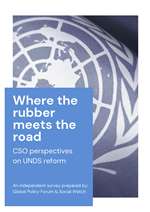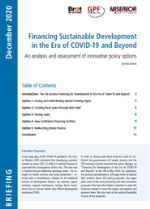Published on Thu, 2021-03-18 11:02
The promise of the SDGs makes governments accountable but who is to be made responsible for global issues like the climate, the pandemic or finances? Join us to discuss this issue in a workshop hosted by Global Policy Forum, Global Policy Watch and Social Watch as part of the 2021 SDG Global Festival of Action. The workshop will be held on March 25, 2021 from 04:30 to 05:30 PM (CET). |
Published on Fri, 2021-02-19 14:13
The demands and urgency of addressing COVID-19 related issues have been added to the already crowded United Nations agenda, with consideration and intensity shifting up and down on the scale of priorities. |
Published on Thu, 2021-02-18 22:20
The United Nations and Member States begin the 2021 calendar confronted with the need to address the ongoing COVID-19 crisis and growing global inequalities. Despite the WHO’s efforts to make the COVID-19 vaccine “affordable and accessible for all” through the ACT Accelerator and calls by CSOs and UN leadership and world leaders for a People’s Vaccine (a global public good free from Intellectual Property Rights), the global vaccine distribution/rollout has been dominated by wealthy, developed countries, with little if any vaccines available for small and medium developing countries. |
Published on Mon, 2021-02-01 14:24
A survey among CSOs in “programme countries” evidences a very high level of commitment to UN values and principles, much dissatisfaction with the actual operations at country level and articulation of areas for improvement. For a number of CSOs, the UN system is appreciated for its inspiration, legitimization and promotion of the values they stand for, but is also viewed as a competitor for funds and influence, often displacing the social sector instead of building it. And frequently it is seen as both at the same time. |
Published on Wed, 2020-12-09 13:35
An analysis and assessment of innovative policy options In the early days of the COVID-19 pandemic, the United Nations (UN) estimated that developing countries needed an extra US$ 2.5 trillion in external finance to cope with the consequences of the crisis. This vast sum is needed because additional spending needs – for example on health services and social protection – coincide with a simultaneous collapse of all traditional sources of development finance: tax revenue, export earnings, migrant remittances, foreign direct investment and, to a lesser extent, also official development assistance (ODA). In order to discuss how these finances could be mobilized, the governments of Canada, Jamaica and the UN Secretary-General launched the policy dialogue on “Financing for Development in the Era of COVID-19 and Beyond” at the UN in May 2020. |







